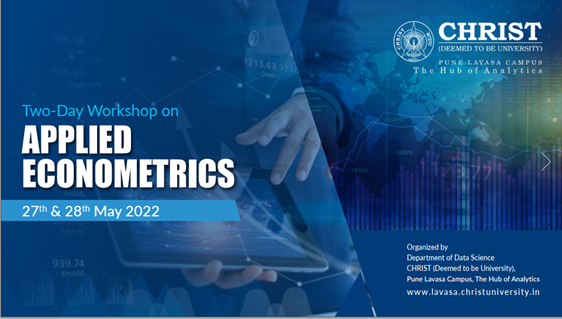WORKSHOP ON APPLIED ECONOMETRICS
The Department of Data Science of CHRIST (Deemed to be University), Pune Lavasa Campus, organised a Two-day Workshop on 'Applied Econometrics' on 27th -28th May 2022. The workshop was divided into eight sessions for over two days.
Applied econometrics integrates conceptual econometrics and empirical data to offer insight into the dynamics of economic theories. Against this context, the workshop aimed to impart knowledge of econometric models and techniques that facilitate empirical research in the domain of economics and finance. The workshop covered a vast repertoire of econometric topics, which allowed the participants to understand how to analyze economic and financial data and how to derive policy conclusions through the use of different methods. The workshop not only equipped participants with econometric methods of data analysis but also delineated the road map for applications of these models in empirical research.
Day 1 Session 1 commenced with a session on the types of Data and Selection of Statistical Tools. The session started with the welcome address by Dr Kedar Vishnu, Coordinator of Economics, CHRIST (Deemed to be University), Pune Lavasa Campus. After which, Dr Lija Jacob, Associate HOD, Department of Data Science, CHRIST (Deemed to be University), Pune Lavasa Campus, addressed the gathering, educating them about the value of this workshop. The session's speaker was Dr Anurag Asawa, Associate Professor of Economics at the Gokhale Institute of Politics and Economics, Pune. Dr Asawa gave valuable insights regarding the different statistical tools that econometricians may use to make inferences concerning their research study. He explained different contexts of research problems and appropriate statistical tools. The session set the base for the upcoming sessions of the workshop. The session ended with a Q&A session.
The 2nd session on 'Anatomy of Time Series Econometrics' at 10:40 AM was conducted by Dr Sajad Ahmad Bhat. Dr Sajad is a well-reputed researcher who has published his works in internationally renowned journals. Dr Sajad made the participants familiar with stochastic processes and their properties in this session. He also explained the concepts of stationary and non-stationary data in time series. He also discussed AR, MA processes, ACF, and PACF. He explained how we could detrend the data. Towards the end of the session, participants raised some questions, which the resource person addressed.
Dr Indrajit Bairagya was the resource person for the third session of the day on 'Data Extraction'. He talked about extracting NSSO data. Data extraction and cleansing is the most prevalent issue that researchers encounter. Dr Indrajit gave a detailed overview of the history of MOSPI and NSSO in the first fifteen minutes of the session. He also talked about the various programmes and the NSSO's schedule. He then went over the benefits and drawbacks of NSSO data. He presented several research papers and instances of how NSSO data might be used. Finally, utilizing NSSO data, he offered full hands-on training on Nesstar software.
The fourth session introduced the resource person, Dr Shahid Bashir, Assistant Professor of Economics, Department of Data Science, CHRIST (Deemed to be University), Pune Lavasa Campus. Dr Shahid gave a detailed overview of the use of dummy variables in regression which was a splendid opportunity for all the students to learn about the technicalities associated with the analysis of qualitative variables. The presentation started by discussing different types of variables used in econometric analysis. He dove deep into the use of dummy variables in econometrics. He also discussed the use of the Chow test in the structural break analysis and its limitations. He also exposed the participants to a hands-on exercise using dummies in EViews.
The final session on Day 1 was on the 'Introduction to Panel Data Econometrics' by Dr Masroor Ahmad. Dr Masroor started the session with a basic explanation of the data and the data classification with regard to time. By explaining the basics of time series data and cross-sectional data, Dr Masroor built up the foundation for the participants to better understand his topic, "Introduction to Panel Data Econometrics". Dr Masroor enabled the participants to interpret panel data better through various examples.
The first session of the 2nd day began at 09:00 AM on 28th May 2022. Dr Arif Billah Dar conducted the session on 'Cointegration and Error Correction Mechanism'. The session proved to be very informative as it talked about how we deal with random walk processes in time series econometrics. He gave a detailed overview of the mathematical derivations of various time series concepts and explained the dynamics of cointegration and error correction mechanisms.
Session 2 on 'ARIMA Modelling' commenced with an introduction to the speaker, Dr Sartaj Rasool Rather, working as an Assistant Professor of Economics at BITS Pilani, Dubai Campus. Dr Sartaj started the session with an introduction to time series data. He spoke about the AR and MA processes and the technicalities associated with these concepts. He then discussed ARMA and ARIMA modelling in time series econometrics.
The workshop's final session was on 'Spurious Regression' taken by Dr Shahid Bashir. He spoke on Spurious regression in Time series econometrics with some hands-on training using EViews. He started by discussing what the properties of time series data are. Then, the topic was extended to the stationary, non-stationary time series, random walks with and without drift, and unit root stochastic processes with mathematical and graphical explanations. He talked about what spurious regression is, why it is called spurious regression when we face such a situation, and how can we draw inferences from the same. He used MS excel to demonstrate how to generate a random walk time series and then demonstrated how and when regression results can be spurious.
The workshop concluded with the concluding remarks by Dr Kedar Vishnu and a vote of thanks by Dr Shahid Bashir.







Comments
Post a Comment